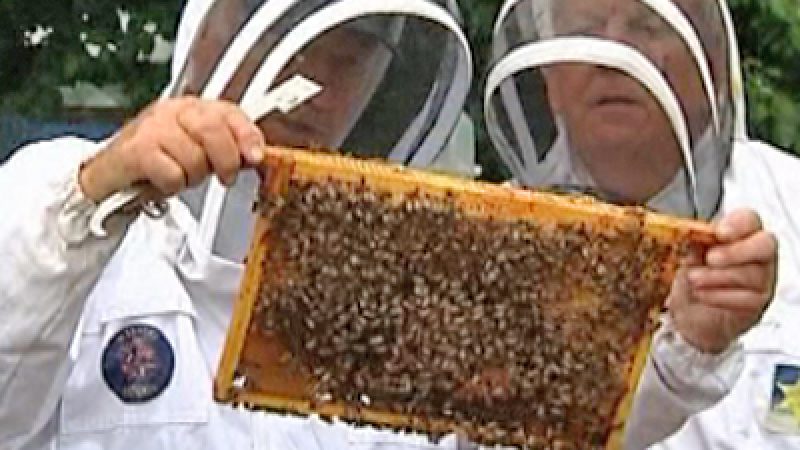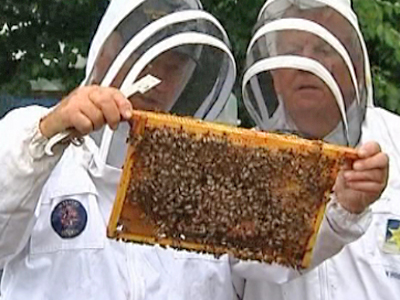
Possible Breakthrough in Breeding Parasite-Resistant Bee

A British beekeeper says he may have discovered a strain of honey bee immune to a parasite that has been gradually wiping out populations of the vital insect worldwide.
Scientists have been trying to find a way to fight the pesticide-resistant Varroa mite.
But now a retired heating engineer who spent 18 years searching for a mite-resistant breed may have found a breakthrough.
Ron Hoskins, 79, from Swindon in southern England, says he has managed to isolate and breed a strain of bees which „groom“ one another, removing the mites.
[Ron Hoskins, Bee Researcher]:
„We noticed that some of them were very healthy and surviving, not debilitated at all and it triggered: ‚Why, what’s happening, what’s going on?'“
After examining enlarged images of dead mites recovered from the hives containing healthy bees he found some had been damaged.
[Ron Hoskins, Bee Researcher]:
„That damage is obvious, it’s done by another bee tearing this off a sister bee.“
His work received backing from Francis Ratniek, professor of apiculture at Sussex University, south of London.
[Francis Ratniek, Professor of Apiculture]:
„I certainly agree with the general idea of trying to breed disease-resistant honey bees and in fact we’re doing that at the University of Sussex. What we’re breeding for in Sussex is what we call ‘hygiene’ – not so much grooming, but the removal of dead or dying individuals so that the Varroa mites can’t breed easily and other diseases can’t spread on larvae and pupae.“
Hoskins says recent research has found more than two thirds of Britain’s honeybees have been lost to the parasite.
He is now looking for funding to further his research and has an invitation from Australian officials and counterparts eager to keep the parasite at bay.
 Foto: NTDTV
Foto: NTDTV


![[Live ab 16 Uhr] Wahlkampf-Endspurt von Die Linke in Berlin](https://images-de.epochtimes.de/uploads/2025/02/Thumbnail_DieLinke_Endspurt-400x225.jpg)
























vielen Dank, dass Sie unseren Kommentar-Bereich nutzen.
Bitte verzichten Sie auf Unterstellungen, Schimpfworte, aggressive Formulierungen und Werbe-Links. Solche Kommentare werden wir nicht veröffentlichen. Dies umfasst ebenso abschweifende Kommentare, die keinen konkreten Bezug zum jeweiligen Artikel haben. Viele Kommentare waren bisher schon anregend und auf die Themen bezogen. Wir bitten Sie um eine Qualität, die den Artikeln entspricht, so haben wir alle etwas davon.
Da wir die Verantwortung für jeden veröffentlichten Kommentar tragen, geben wir Kommentare erst nach einer Prüfung frei. Je nach Aufkommen kann es deswegen zu zeitlichen Verzögerungen kommen.
Ihre Epoch Times - Redaktion